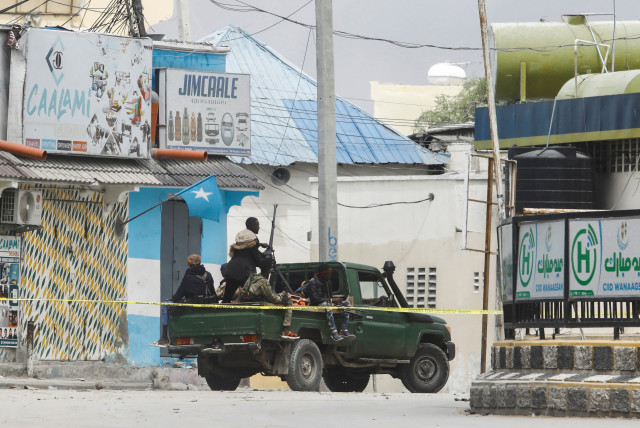Somali gov't hails victory in battle against al-Shabab but gains may be short-term

Somali security forces eliminated over 160 members of the extremist organization in a major operation, but analysts say that for the government to succeed, it must win the support of local clans.
Somali lawmakers were hailing a victory last week after Somali security forces killed more than 160 members of the al-Shabab extremist Islamist organization in a major four-day operation, part of a government campaign begun in May last year to reduce the terrorist organization’s influence in Somalia.
However, analysts say most of the campaign’s achievements have been short-term and are undermined by the government’s inability to secure regained territories and retain the loyalty of local clans.
Information, Culture, and Tourism Minister Daud Aweis Jama announced the achievement at a press conference in Mogadishu, saying that more than 160 terrorists were eliminated during the operation from July 28 to 31 in Galgaduud in central Somalia and El Dhun in the southwest.
“During the operations, the Somali national forces [also] destroyed vehicles and other equipment belonging to the enemy,” Jama said.
Federal Parliament member Malik Abdalla told The Media Line that the campaign’s achievements were many.
“This is the first time that the Somali people have been able to defeat al-Shabab and the confidence is very high. Now people have started talking about the post-al-Shabab [era],” he said.
However, Benedict Manzin, lead analyst of the Middle East and Africa at the Sybilline strategic risk consultancy, said the significance of the operation will depend entirely on how it is followed up and whether the government will be able to consolidate gains made against al-Shabab.
“The government was able to inflict hundreds of casualties on al-Shabab last year during offensives in central Somalia but has struggled to solidify those advances,” he said.
Manzin said that al-Shabab has been making progress in restoring its influence in areas captured by the government earlier in the campaign. He said this was partly due to the government’s failure to provide financial aid to some of the clans that supported the offensive.
“Increased pressure on food security driven by repeated droughts has elevated tensions between the clans,” he said. He added that al-Shabab had exploited the situation by supporting smaller clans in challenging larger clans, distracting the larger clans from concentrating their resources against al-Shabab and even leading to the agreement of cease-fires with al-Shabab so that the clans could focus on their domestic affairs.
“The achievements appear to have been primarily short-term,” he said. “Al-Shabab has been able to continue frequent and high-casualty attacks across Somalia.” As an example, he mentioned the May 26 attack in Bulo Marer, 120 kilometers southwest of Mogadishu, in which 54 Ugandan soldiers were killed.
Manzin said the government had made significant progress in exerting pressure on al-Shabab positions in central Somalia, resulting in the successful reclamation of crucial territories, including Aboorey and Yasooman in the central Hiran region, among 80 seized areas across the central states of Galmudug and Hirshabelle.
“This is of course significant and is key to degrading al-Shabab’s influence, undercutting their revenues and recruitment potential,” he said. “But the offensive also highlighted how dependent the country remains on the loyalty of clan militias.”
Regaining support of local clans
For al-Shabab, regaining the support of local clans that had previously turned against it was key to forming a successful alliance to regain some territories, Manzin said.
“The government has struggled to retain the loyalty and commitment of these groups,” he said.
The Somali government needs to find a way to sever al-Shabab’s connections with key communities and clans and reduce its influence over them, he said, in part by substantially increasing economic support to them.
He said the country’s security situation had not changed significantly despite the government campaign, and that while the rate of al-Shabab attacks might have declined in recent months, sporadic attacks have continued as the organization targets government and military officials in an attempt to disrupt planning for offensive operations.
Abdalla said that the country’s economy had been badly affected by the turmoil.
“I have never seen the economy going this bad,” Abdalla said. “One of the main factors was that the terrorist network was also conducting business, and now they have stopped doing business as their bank accounts are frozen, and this had an effect on the market. They have disabled the entire nation. No foreign investment and no one can afford to even travel freely in the country because of the terrorists.”
Jerusalem Post Store
`; document.getElementById("linkPremium").innerHTML = cont; var divWithLink = document.getElementById("premium-link"); if (divWithLink !== null && divWithLink !== 'undefined') { divWithLink.style.border = "solid 1px #cb0f3e"; divWithLink.style.textAlign = "center"; divWithLink.style.marginBottom = "15px"; divWithLink.style.marginTop = "15px"; divWithLink.style.width = "100%"; divWithLink.style.backgroundColor = "#122952"; divWithLink.style.color = "#ffffff"; divWithLink.style.lineHeight = "1.5"; } } (function (v, i) { });

